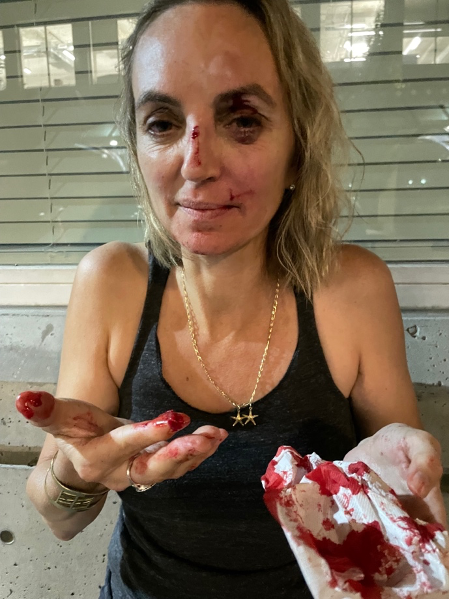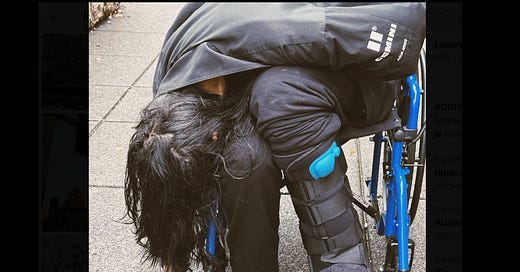Drugs 1 - Oregon 0
"Fuck no, I wouldn't vote for it again," says a previous proponent of Measure 110, the 2020 law that decriminalized drugs and which the Oregon legislature reeled back this week. How did we get here?
When I moved to Portland in 2004, the junkies in downtown's Pearl District, romanticized in Gus Van Sant's 1989 Drugstore Cowboy, had been replaced by farm-to-table restaurants and a flagship REI store. Portland was on the up, a media darling poised to become the next great American city.
Then came the record scratch that was 2020.
With the nightly riots in Portland entering their seventh month and the air ringing with chants of “DEFUND THE POLICE!,” citizens were asked that November to vote on Ballot Measure 110, the Drug Addiction Treatment and Recovery Act. Offering addicts a soft landing rather than jail time - those possessing and using hard drugs in public would face no penalty other than a possible $100 citation, waived should the user voluntarily enter drug treatment - was in step with the year's anti-carceral mood. Its passage would also give Oregonians the distinction of being the first state in the nation to fully decriminalize drugs.
Dozens of organizations supported Measure 110, from the editorial board of The Oregonian to the Oregon ACLU. Harm reduction advocates saw Measure 110 as a “humane, effective approach that will save lives” and a positive step toward granting bodily autonomy to those who chose to do drugs. Portland’s newly elected progressive district attorney Mike Schmidt said Measure 110 “sends a clear message of strong public support that drug use should be treated as a public health matter rather than a criminal justice matter.”
Measure 110 passed with 59 percent of the vote.
“For us, it's like this dream happened,” said the executive director of the New York-based nonprofit Drug Policy Alliance, which had pumped an estimated $5 million into getting Measure 110 passed.
Meanwhile those living the dream saw an effort meant to help addicts act instead as an accelerant. Fatal opioid overdoses skyrocketed, especially from fentanyl. The number of homeless in Portland swelled to 6300. Violent crime spiked before dipping in 2023. People stopped going downtown, both because of the perception of danger and because it was too sad, seeing hundreds of people dope-sick, smoking fentanyl under blankets, shooting up in the park, stepping over used syringes and the foil and straws distributed free by advocates of harm reduction. Oregonians started having second thoughts, started wondering if their impetus to help was making things worse.

“Yes I voted for 110—and it’s one of the only votes I’ve ever regretted,” says Sabrina Trembley, a painter living in Lake Oswego, just south of Portland. “It sounded like a compassionate plan, and decriminalizing small amounts of street drugs would relieve the burden of our jails. However all it did was attract drug users into Portland, and fentanyl started blowing up. How quickly our beautiful city descended into ‘zombie land’ was astonishing.”
Part of the descent could be laid at the feet of the state and its failed rollout of Measure 110. While the decriminalization component went into effect in February 2021, the allocation of treatment funds did not. A June 2022 audit found that $278 million of the $302 million earmarked for “recovery” had yet to reach providers, due to a shortage of available treatment centers and providers, as well as having to come up with Measure 110's infrastructure in real time. (You would not be alone in thinking it might have been a good idea to have the infrastructure in place before facilitating people to do as much fentanyl, heroin and meth as they wanted.) A December 2023 audit showed continuing accountability problems, including having to terminate contracts with grant money recipients who failed to provide services to addicts.
"What's the diplomatic word for 'shitshow'?" asks County Commissioner Julia Brim-Edwards. "People's hearts were where they should be, but the planning was so bad. In retrospect, 110 was not then, and is not ever going to be, the solution to our drug crisis."
By 2023, Oregonians had changed their minds about Measure 110, 73% of those polled saying they supported making possession of hard drugs a crime again. Last December, The Oregonian editorial board called for the re-criminalization of drugs. In January, Gov. Tina Kotek declared a 90-day "fentanyl emergency" for downtown Portland, presumably to get services in place, though how is as yet unclear.
“It’s taken far too long to decide we have an emergency on our hands, and it certainly won’t be over in 90 days,” according to County Commissioner Sharon Meieran, who’d been trying for years to get officials to acknowledge the scope of the crisis, which citizens had no trouble recognizing.
“Fuck no, I wouldn’t vote for it again,” says Aidan Wolff, a musician and bartender from Portland. "It's 11 o'clock in the morning and there's a flash-mob, 18 to 20 people in the parking lot of Carl's Jr. having a fentanyl party. There's just a general feeling of lawlessness. There are fires, things are burned out, the cops can't do anything.”
The defenestration of law enforcement, when it came to making drug arrests, was baked into Measure 110. While Portland only partially succeeded in its effort to defund police in 2020, staffing levels remain low, with officers' time frequently spent interacting with street-level drug users the only way they legally can: administering Narcan, sometimes to the same person multiple times a day.
Proponents of Measure 110 argue that correlation does not equal causation; that you can recriminalize drugs tomorrow and still have people choose to use and overdose on hard drugs. Sure. But does that mean Measure 110 cannot be improved upon? Last October, eight people in their late teens and early 20s overdosed in one incident in Portland's Pearl District, where I not long ago watched a tableaux that included a man picking at his infected feet, another shaking his penis at me, and a woman who lifted her dress and shat. Portland has seen historic outmigration, in part due to high crime and the homelessness crisis. REI closed its flagship store on February 1, citing the highest number of break-ins in two decades.
Keep reading with a 7-day free trial
Subscribe to Make More Pie to keep reading this post and get 7 days of free access to the full post archives.





